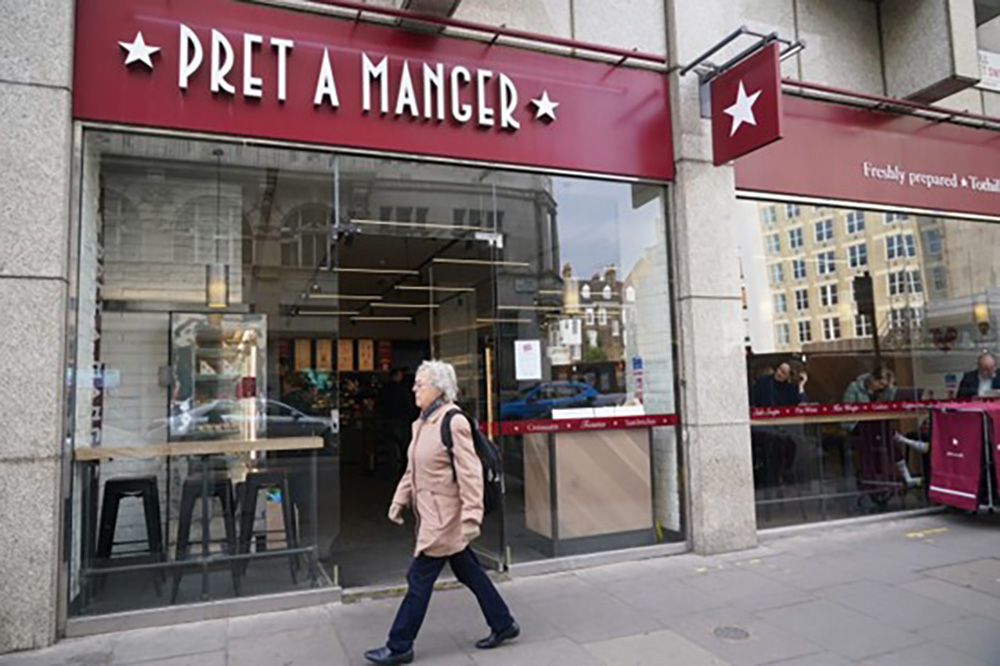
英国日益严重的通货膨胀不见得是世界末日,至少对于朱利安·梅特卡夫创建的著名连锁超市Pret A Manger和Itsu是这样。
梅特卡夫曾经遭遇过更糟糕的状况。上世纪80年代末,梅特卡夫创建了Pret,不久欧洲内部开始了自由运动, 利率大幅升高。
现在,距离英国脱欧已经过去了数年时间,但利率依旧居高不下,而且可能进一步上涨,但这与Itsu CEO梅特卡夫以前的经历相比不值一提。
梅特卡夫在周四发布的一条彭博社播客中表示:“所有人都抱怨5%的利率,认为这是世界末日。但我记忆中利率曾经高达14%。”
Pret如今在全球拥有600多家门店,其中四分之一位于英国境外,而亚洲食品合资品牌Itsu在欧洲有约80家门店。
两家公司的创始人梅特卡夫表示,尤其是随着成本上涨,经营餐馆变得越来越难。
梅特卡夫表示:“自疫情暴发以来,如果你去餐厅,你会发现现在价格贵得离谱。这是因为餐厅需要大量人手,而且食材成本上涨。”
将上涨的成本转嫁给消费者
英国物价暴涨,6月的通胀率与一年前相比提高到7.9%。
虽然5月的通胀率高达8.7%,但这依旧远高于英格兰银行2%的目标。
食品杂货支出受到的影响最严重,消费必需品价格屡创新高,加剧了英国的生活成本危机。
危机还蔓延到餐厅,做同样的菜肴成本上涨。
为了应对费用上涨问题,许多餐饮业的公司试图通过涨价将成本转嫁给消费者。
达美乐(Domino’s )在英国提高了披萨的售价并大获成功,但喜力(Heineken)希望啤酒涨价却遭遇了困难。
就连Pret今年早些时候也将其咖啡订购价格上涨了20%。目前Pret的负责人是帕诺·赫里斯图。
但梅特卡夫表示,Itsu努力避免大幅涨价。
他说道:“如果你的公司真得效率不高,唯一的办法就是涨价。在Itsu,我们做到了不大幅涨价。我们的价格仅小幅上涨,幅度不大。”
专家们看到了物价降温的初步迹象——6月,食品价格上涨17.3%,而5月的涨幅为18.3%,同期餐厅通胀率从10.3%下降到9.5%。
这对于餐饮业而言也是好消息,因为食材价格也会随之下降。虽然这些公司可能不会降价,但他们可以放弃继续涨价。(财富中文网)
翻译:刘进龙
审校:汪皓
位于伦敦的一家Pret A Manger门店。摄影:YUI MOK —— PA IMAGES/盖蒂图片社
英国日益严重的通货膨胀不见得是世界末日,至少对于朱利安·梅特卡夫创建的著名连锁超市Pret A Manger和Itsu是这样。
梅特卡夫曾经遭遇过更糟糕的状况。上世纪80年代末,梅特卡夫创建了Pret,不久欧洲内部开始了自由运动, 利率大幅升高。
现在,距离英国脱欧已经过去了数年时间,但利率依旧居高不下,而且可能进一步上涨,但这与Itsu CEO梅特卡夫以前的经历相比不值一提。
梅特卡夫在周四发布的一条彭博社播客中表示:“所有人都抱怨5%的利率,认为这是世界末日。但我记忆中利率曾经高达14%。”
Pret如今在全球拥有600多家门店,其中四分之一位于英国境外,而亚洲食品合资品牌Itsu在欧洲有约80家门店。
两家公司的创始人梅特卡夫表示,尤其是随着成本上涨,经营餐馆变得越来越难。
梅特卡夫表示:“自疫情暴发以来,如果你去餐厅,你会发现现在价格贵得离谱。这是因为餐厅需要大量人手,而且食材成本上涨。”
将上涨的成本转嫁给消费者
英国物价暴涨,6月的通胀率与一年前相比提高到7.9%。
虽然5月的通胀率高达8.7%,但这依旧远高于英格兰银行2%的目标。
食品杂货支出受到的影响最严重,消费必需品价格屡创新高,加剧了英国的生活成本危机。
危机还蔓延到餐厅,做同样的菜肴成本上涨。
为了应对费用上涨问题,许多餐饮业的公司试图通过涨价将成本转嫁给消费者。
达美乐(Domino’s )在英国提高了披萨的售价并大获成功,但喜力(Heineken)希望啤酒涨价却遭遇了困难。
就连Pret今年早些时候也将其咖啡订购价格上涨了20%。目前Pret的负责人是帕诺·赫里斯图。
但梅特卡夫表示,Itsu努力避免大幅涨价。
他说道:“如果你的公司真得效率不高,唯一的办法就是涨价。在Itsu,我们做到了不大幅涨价。我们的价格仅小幅上涨,幅度不大。”
专家们看到了物价降温的初步迹象——6月,食品价格上涨17.3%,而5月的涨幅为18.3%,同期餐厅通胀率从10.3%下降到9.5%。
这对于餐饮业而言也是好消息,因为食材价格也会随之下降。虽然这些公司可能不会降价,但他们可以放弃继续涨价。(财富中文网)
翻译:刘进龙
审校:汪皓
A Pret A Manger store in London.
Roaring inflation in the U.K. doesn’t spell need to spell doom—at least not for widely popular chains Pret A Manger and Itsu, founded by Julian Metcalfe.
He has seen worse days—when Metcalfe first launched Pret in the late 1980s and before the era of free movement within Europe began, interest rates were much higher.
Now, years after Brexit has been formalized, interest rates are still considered high—and are expected to rise further—but they’re only a fraction of what the Itsu CEO witnessed before.
“Everyone’s complaining about 5% and it’s the end of the world,” Metcalfe said in a Bloomberg podcast released Thursday. “Back then I remember we paid 14%.”
Pret has since grown to over 600 stores worldwide—a quarter of which are outside the U.K., while Itsu, the Asian food joint, has around 80 locations in Europe.
The founder of the two companies said that operating in the restaurant business has gotten increasingly harder, especially since costs have gone up.
“Since COVID, when you go out to a restaurant, it’s frighteningly expensive now,” Metcalfe said. “That is all because it’s very, very labor-intensive and the ingredients’ costs have gone up.”
Passing on increased costs to the consumer
Prices in the U.K. have skyrocketed, with inflation standing at 7.9% in June compared to a year ago.
While that number is down from 8.7% in May, the rate is still well above the Bank of England’s 2% target.
Grocery bills have been among the hardest hit, creating new record highs in the price of consumer staple goods and compounding Britain’s cost-of-living crisis.
Those have also trickled down to restaurants, where it’s more expensive to make the same dishes they did before.
To cope with rising expenses, a number of companies in the food and beverage industry have tried to pass on costs to consumers by hiking prices.
Domino’s U.K. did so with its pizzas with great success, while Heineken ran into trouble when it tried the same with its beers.
Even Pret, now headed by Pano Christou, hiked the prices of its coffee subscription by 20% earlier this year.
But Itsu has tried to steer clear from increasing prices drastically, according to Metcalfe.
“If your business is inefficient, really inefficient, the only way to handle is to put your prices up,” he said. “At Itsu, we’ve managed not to do that. Our prices have gone up by a tiny bit, but not much.”
Experts are seeing early signs that prices are cooling—in June, food prices rose 17.3% compared to 18.3% in May, while restaurant inflation dropped from 10.3% to 9.5% during the same period.
This could be good news for companies in the restaurant business, too, as it would drive ingredient prices down. And while those companies may not cut prices, they may hold back from increasing them further.






